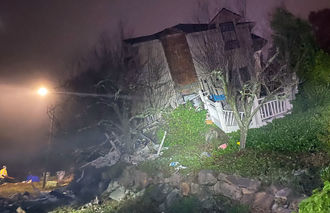Early the morning of Jan. 17, 2022 a landslide occurred in the Somerset neighborhood, pushing a house on the 5000 block of 139th Place Southeast off its foundation and causing it to partially collapse. Callers reported a large amount of water and debris flowing through the cul de sac. Bellevue police officers and firefighters responded; officers rescued one person and a dog from the collapsed house.
More than a dozen homes in the neighborhood were evacuated. Bellevue Utilities crews found what appeared to be a broken water main in the area and were able to close the valve and reroute the water supply. Officials determined that seven homes remained unsafe to occupy due to debris and the partially collapsed house perched on a hillside near the entrance to the cul de sac.
City news releases provide details:
- Feb. 4 - Agreement reached to demolish house, allow family to salvage property
- Feb. 1 - City takes legal action to secure dangerous site
- Jan. 20 - Increased security following break-in at slide site
- Jan. 19 - Response work on Somerset landslide continues
- Jan. 17 - Water and power restored after emergency response in Somerset neighborhood
City Assistance
The city helped residents impacted by the landslide, providing immediate shelter at a local community center and connections to disaster agencies including the American Red Cross, along with information about handling the aftermath of a disaster. Impacted owners and neighbors can contact Mark Heilman (425-452-2735 or mheilman@bellevuewa.gov) in Neighborhood Services if they have questions.
Identifying Water Leaks
Bellevue Utilities maintains more than 600 miles of pressurized water main across a varied topography that ranges from 20 feet above sea level on the shores of Lake Washington to over 1,400 feet above sea level near Cougar Mountain. The city monitors the condition of its water system, including pipes, reservoirs, pump stations, pressure zones and fire hydrants, and repairs or replaces assets as necessary (Utilities capital projects).
Utilities proactively replaces about five miles of water mains annually. Only about 30 water main breaks occur in Bellevue each year, a very low number compared to the national average. Utilities performs regular leak detection on pipes throughout the city. When leaks and breaks occur, crews mobilize quickly to perform necessary repairs, replacing an entire pipe section if necessary to prevent future pipe breaks.
While the city maintains water mains and service lines in the public right of way, homeowners are responsible for the private line that runs from the water meter to their home. Signs of possible water leaks on your private water line and/or home plumbing include a dripping faucet, pooling water under an appliance or in the yard, or a higher-than-normal water bill (testing for leaks). As with all leaks, spotting small issues and fixing them quickly is key to preventing larger leaks or pipe bursts.
If you see water bubbling up or gushing from a street, please contact the city’s 24-hour emergency line immediately at 425-452-7840. The city relies on reports from our residents to help us identify and fix small leaks before they become large breaks.
Preventing Landslides
Bellevue is hilly and experiences significant amounts of rainfall, which makes it susceptible to landslides. Consult Landslides for warning signs of a slide. To help prevent them, Bellevue's land-use code limits construction and/or clearing of vegetation in critical areas, which include geological hazard areas. Avoid building on steep slopes, drainage routes and areas where there is a lot of erosion.
Property owners who live near or on a steep slope are encouraged to hire a state-licensed geotechnical engineer to evaluate the slope and provide recommendations for mitigation of slide hazards. A geotechnical engineer should be consulted before taking any action that may impact steep slopes, such as performing unpermitted work or removing or adding fill material (soil, sand, rock, debris). Homeowners should:
- maintain vegetation on slopes to help stabilize soil
- connect all storm drains on or above a slope via tightline to approved discharge locations at the bottom of the slope
Not sure if you're on what's considered a steep slope? You can consult the Bellevue map viewer, which has a layer for contours. Questions about permits or Bellevue building codes should go to permits@bellevuewa.gov.
Emergency Resources
Ready.gov has information on disaster preparedness, including how to prepare an emergency kit or "go bag," and what to do should you be impacted by a disaster. The city offers ways to be alerted about emergencies at Alerts and Notifications.

